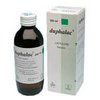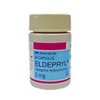 | Methotrexate Active Ingredient: Methotrexate Methotrexate is used for treating certain types of cancer, severe psoriasis, or rheumatoid arthritis in certain patients. |
INDICATIONS
Methotrexate is used for treating certain types of cancer, severe psoriasis, or rheumatoid arthritis in certain patients. It may be used alone or with other medicines. Methotrexate is an antimetabolite. It works to treat cancer and psoriasis by blocking an enzyme needed for cell growth. This helps to slow the growth of cancer cells and abnormal skin cells. It reduces symptoms of inflammation (eg, pain, swelling, stiffness) caused by rheumatoid arthritis.
INSTRUCTIONS
Use Methotrexate as directed by your doctor!
- Take Methotrexate by mouth with or without food. However, you should take it the same way each time in relation to food.
- Drinking extra fluids while you are taking Methotrexate is recommended. Check with your doctor for instructions.
- Be sure you understand exactly how much of Methotrexate to take and how often you should take it. Ask your doctor or pharmacist if you have any questions.
- It may take several weeks for your symptoms to improve. Do not stop taking Methotrexate without checking with your doctor.
- Methotrexate works best if each dose is taken at the scheduled time.
- Continue to take Methotrexate even if you feel well. Do not miss any doses.
- If you miss a dose of Methotrexate, contact your doctor right away. Do not take 2 doses at once.
Ask your health care provider any questions you may have about how to use Methotrexate.
STORAGE
Store Methotrexate at room temperature, between 68 and 77 degrees F (20 and 25 degrees C). Store away from heat, moisture, and light. Do not store in the bathroom. Keep Methotrexate out of the reach of children and away from pets.
Do NOT use Methotrexate if:
- you are allergic to any ingredient in Methotrexate
- you are treating psoriasis or rheumatoid arthritis and you are pregnant or breast-feeding
- you are treating psoriasis or rheumatoid arthritis and abuse alcohol or have liver problems, an immunodeficiency syndrome (eg, AIDS), bone marrow problems, or blood problems (eg, anemia, low white blood cell count, low platelet count)
- you have moderate or severe kidney problems
- you are taking acitretin.
Contact your doctor or health care provider right away if any of these apply to you.
Some medical conditions may interact with Methotrexate. Tell your doctor or pharmacist if you have any medical conditions, especially if any of the following apply to you:
- if you are pregnant, planning to become pregnant, or are breastfeeding
- if you are taking any prescription or nonprescription medicine, herbal preparation, or dietary supplement
- if you have allergies to medicines, foods, or other substances
- if you have a history of lung problems, immune system problems, nervous system problems (eg, seizures), liver problems (eg, hepatitis), or blood problems (eg, anemia, low white blood cells, low blood platelets)
- if you have an active infection, severe vomiting or diarrhea, or dehydration
- if you have mouth sores, excess fluid in your stomach or around your lungs, stomach or intestinal ulcers, bowel inflammation (eg, ulcerative colitis), or a blockage of your stomach or bowel
- if you have a folic acid deficiency, are in very poor health, or have a history of alcohol abuse
- if you are receiving chemotherapy or radiation.
Some medicines may interact with Methotrexate. Tell your health care provider if you are taking any other medicines, especially any of the following:
- Acitretin, azathioprine, etretinate, leflunomide, retinoids, or sulfasalazine because the risk of liver problems may be increased
- Chloramphenicol, corticosteroids (eg, prednisone), cyclosporine, dantrolene, hydantoins (eg, phenytoin), nonsteroidal anti-inflammatory drugs (NSAIDs) (eg, ibuprofen, celecoxib), penicillin antibiotics, phenylbutazone, pristinamycin, probenecid, quinolone antibiotics (eg, ciprofloxacin), salicylates (eg, aspirin), sulfonamides (eg, sulfamethoxazole), tetracycline, or trimethoprim because they may increase the risk of Methotrexate's side effects
- Folic acid or leucovorin because they may decrease Methotrexate's effectiveness
- Digoxin because its effectiveness may be decreased by Methotrexate
- Anticoagulants (eg, warfarin), cyclosporine, or theophylline because the risk of their side effects may be increased by Methotrexate.
This may not be a complete list of all interactions that may occur. Ask your health care provider if Methotrexate may interact with other medicines that you take. Check with your health care provider before you start, stop, or change the dose of any medicine.
Important safety information:
- Methotrexate may cause drowsiness, dizziness, or blurred vision. These effects may be worse if you take it with alcohol or certain medicines. Use Methotrexate with caution. Do not drive or perform other possibly unsafe tasks until you know how you react to it.
- Check with your doctor before you drink alcohol while you are taking Methotrexate.
- Nausea, vomiting, and loss of appetite are common with Methotrexate. Ask your doctor or pharmacist for ways to decrease these effects if they occur.
- If vomiting or diarrhea occurs, you will need to take care not to become dehydrated. Contact your doctor for instructions.
- Methotrexate may cause you to become sunburned more easily. Avoid the sun, sunlamps, or tanning booths until you know how you react to Methotrexate. Use a sunscreen or wear protective clothing if you must be outside for more than a short time.
- Methotrexate may reduce the number of clot-forming cells (platelets) in your blood. Avoid activities that may cause bruising or injury. Tell your doctor if you have unusual bruising or bleeding. Tell your doctor if you have dark, tarry, or bloody stools.
- Methotrexate may lower the ability of your body to fight infection. Avoid contact with people who have colds or infections. Tell your doctor if you notice signs of infection like fever, sore throat, rash, or chills.
- Do not receive a live vaccine (eg, measles, mumps) while you are taking Methotrexate. Talk with your doctor before you receive any vaccine.
- Men who take Methotrexate should always use a condom when having sex with a woman who may become pregnant. Do this for as long as you take Methotrexate and for 3 months after you stop taking it.
- Do NOT take more than the recommended dose or use for longer than prescribed without checking with your doctor.
- Lab tests, including albumin levels, complete blood counts, and liver, lung, and kidney function, may be performed while you use Methotrexate. These tests may be used to monitor your condition or check for side effects. Be sure to keep all doctor and lab appointments.
- Use Methotrexate with caution in the elderly; they may be more sensitive to its effects.
- Methotrexate should be used with extreme caution in children younger than 2 years old; safety and effectiveness in these children have not been confirmed.
- Pregnancy and breast-feeding: Methotrexate may cause birth defects and fetal and newborn death if you take it while you are pregnant. Do not become pregnant while you are using it. Use an effective form of birth control while you take Methotrexate and for at least 1 ovulatory cycle after you stop taking it. If you think you may be pregnant, contact your doctor right away. Methotrexate is found in breast milk. Do not breast-feed while taking Methotrexate.
All medicines may cause side effects, but many people have no, or minor, side effects.
Check with your doctor if any of these most common side effects persist or become bothersome:
Dizziness; headache; loss of appetite; mild hair loss; nausea; stomach pain or upset; tiredness; vomiting.
Seek medical attention right away if any of these severe side effects occur:
Severe allergic reactions (rash; hives; itching; difficulty breathing; tightness in the chest; swelling of the mouth, face, lips, or tongue); black, tarry stools; blood in the urine; calf or leg pain or swelling; change in the amount of urine; chest pain; coma; confusion; coughing up blood; dark urine; diarrhea; difficult or painful urination; dry cough; fever, chills, or sore throat; menstrual changes; mental or mood changes; mouth sores; one-sided weakness; red, swollen, peeling, or blistered skin; seizures; severe or persistent nausea or vomiting; shortness of breath; speech changes; unusual bleeding or bruising; unusual pain and discoloration of the skin; unusual tiredness or weakness; vision changes or vision loss; yellowing of skin or eyes.
This is not a complete list of all side effects that may occur. If you have questions about side effects, contact your health care provider. Call your doctor for medical advice about side effects.
 Calcium CarbonateCalcium carbonate is used to prevent and to treat calcium deficiencies.as low as $0.65
Calcium CarbonateCalcium carbonate is used to prevent and to treat calcium deficiencies.as low as $0.65 DuphalacDuphalac is used to treat chronic constipation.as low as $34.36
DuphalacDuphalac is used to treat chronic constipation.as low as $34.36 MeclizineMeclizine is used for preventing and treating nausea, vomiting, and dizziness associated with motion sickness.as low as $0.44
MeclizineMeclizine is used for preventing and treating nausea, vomiting, and dizziness associated with motion sickness.as low as $0.44 EldeprylEldepryl is used in combination with levodopa or levodopa and carbidopa combination to treat Parkinson's disease (sometimes called shaking palsy or paralysis agitans). This medicine works to increase and extend the effects of levodopa, and may help to slow the progress of Parkinson's disease.as low as $0.74
EldeprylEldepryl is used in combination with levodopa or levodopa and carbidopa combination to treat Parkinson's disease (sometimes called shaking palsy or paralysis agitans). This medicine works to increase and extend the effects of levodopa, and may help to slow the progress of Parkinson's disease.as low as $0.74 DulcolaxDulcolax is a stimulant laxative. It acts directly on the bowels, stimulating the bowel muscles to cause a bowel movement.as low as $0.47
DulcolaxDulcolax is a stimulant laxative. It acts directly on the bowels, stimulating the bowel muscles to cause a bowel movement.as low as $0.47 DetrolDetrol is used to treat overactive bladder with symptoms of urinary frequency, urgency, and incontinence.as low as $1.1
DetrolDetrol is used to treat overactive bladder with symptoms of urinary frequency, urgency, and incontinence.as low as $1.1